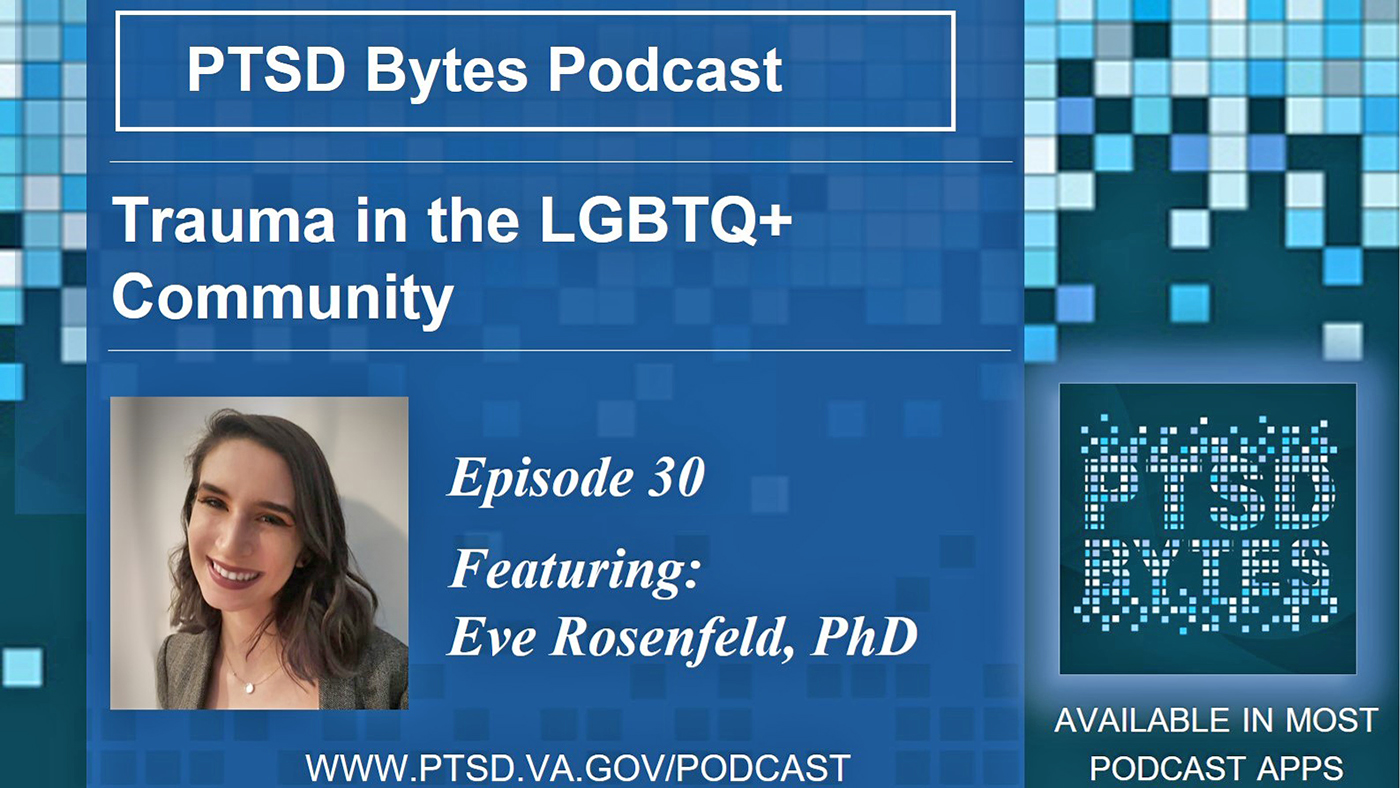In this episode of the PTSD Bytes podcast, the hosts discuss trauma and resilience in the LGBTQ+ community with Dr. Eve Rosenfeld from the National Center for PTSD.
The LGBTQ+ community
The term “LGBTQ+” is a way to talk about people who are lesbian, gay, bisexual, transgender, queer or questioning, and other sexuality or gender identities. It includes people from all walks of life. There is a strong and resilient LGBTQ+ community, but many face extra difficulties because of their identities.
Trauma risk in the LGBTQ+ community
LBGTQ+ people are more likely to experience interpersonal traumas, such as abuse or assault. And these types of traumas are more likely to lead to the development of full-blown posttraumatic stress disorder (PTSD). On top of that, LGBTQ+ people deal with extra stress due to discrimination which can make things even harder.
In this Make the Connection video, LBGTQ+ Veterans talk about their experiences:

Discrimination
Discrimination against LGBTQ+ folks can take many forms. Some are easy to spot, like losing a job because of being transgender. Others are sneakier, like hurtful comments such as, “I don’t care who you love, just don’t make it your whole personality.” There are also unfair laws that can affect housing, education and other areas of life. This discrimination piles up and causes more stress, which can make life feel unsafe at times. LGBTQ+ people also have to manage the stress of when it is safe to be out or to hide their identity.
Impact on mental health
Some people start believing some of the negative things said about the LGBTQ+ community, which can cause feelings of shame. Studies show that LGBTQ+ people are more likely to have issues with substance use, depression, anxiety and thoughts of suicide because of all the stress and discrimination they face. However, a sense of pride and the large social support network that can be accessed by LGBTQ+ folks can help reduce the impact of stress caused by discrimination and trauma.
Mental health care and support for the LGBTQ+ community
It is not always easy for LGBTQ+ people to get the mental health care they may need. Finding a mental health provider who understands these unique experiences is essential. Look for someone who knows about LGBTQ+ culture and can make you feel safe. For LGBTQ+ Veterans, every facility now has an LGBTQ+ Veteran care coordinator who can help connect you to appropriate providers.
You can find more information at the VA LGBTQ+ Health Office website. There aren’t many digital tools specifically for LGBTQ+ trauma, but apps like PTSD Coach and Beyond MST can help with building coping skills.
Creating safe spaces
If you’re a client, you have the right to ask providers questions to make sure you’re comfortable working with them. You could ask how many years experience working with LGBTQ+ clients they have.
If you work in health care, you can make LGBTQ+ folks feel safer by being understanding and open. It’s not just about saying your office is welcoming. It’s about really making it safe. Learn about providing LGBTQ+ affirming care by taking trainings and reading research in your field.
Additional links:
- VA LGBT Mental Health webpage
- Learn more about self-help and coping with PTSD
- Online chat and mental health resources for LGBTQ+ youth (ages 13-24)
- More PTSD Bytes episodes
For health care providers:
- Learn more about Trauma, Discrimination and PTSD Among LGBTQ+ People
- VA recorded webinar: “Clinical Considerations and Guidance for the Treatment of Trauma, PTSD, and Co-occurring Minority Stress among LGBTQ Individuals” (presented by Nicholas Livingston, Ph.D, Aug. 19, 2020)
If you are a Veteran who is experiencing a crisis or supporting a loved one who is, call 988 and press 1 for immediate assistance, or chat online at VeteransCrisisLine.net/chat.
Topics in this story
Link Disclaimer
This page includes links to other websites outside our control and jurisdiction. VA is not responsible for the privacy practices or the content of non-VA Web sites. We encourage you to review the privacy policy or terms and conditions of those sites to fully understand what information is collected and how it is used.
More Stories
Veteran Byron Potier weighed almost 300 pounds and was tired and lethargic. He was the perfect candidate for gastric sleeve surgery.
How much do you know about VA care, benefits and services? Don’t miss out on what you've earned—check out the "2025 VA Federal Benefits Guide for Veterans, Dependents, Survivors, and Caregivers" handbook to learn more.
Feeling stressed? Your breath can help you relax and focus. Take 3 minutes to reset and prioritize your well being for this week's #LiveWholeHealth practice.








It would be more beneficial if you helped veterans walk away from a sexually deviant lifestyle, rather than affirming them in their immoral, confused behavior.
It’s not helpful to encourage someone to live outside of God’s design.
Thank you for this! This will be very helpful.